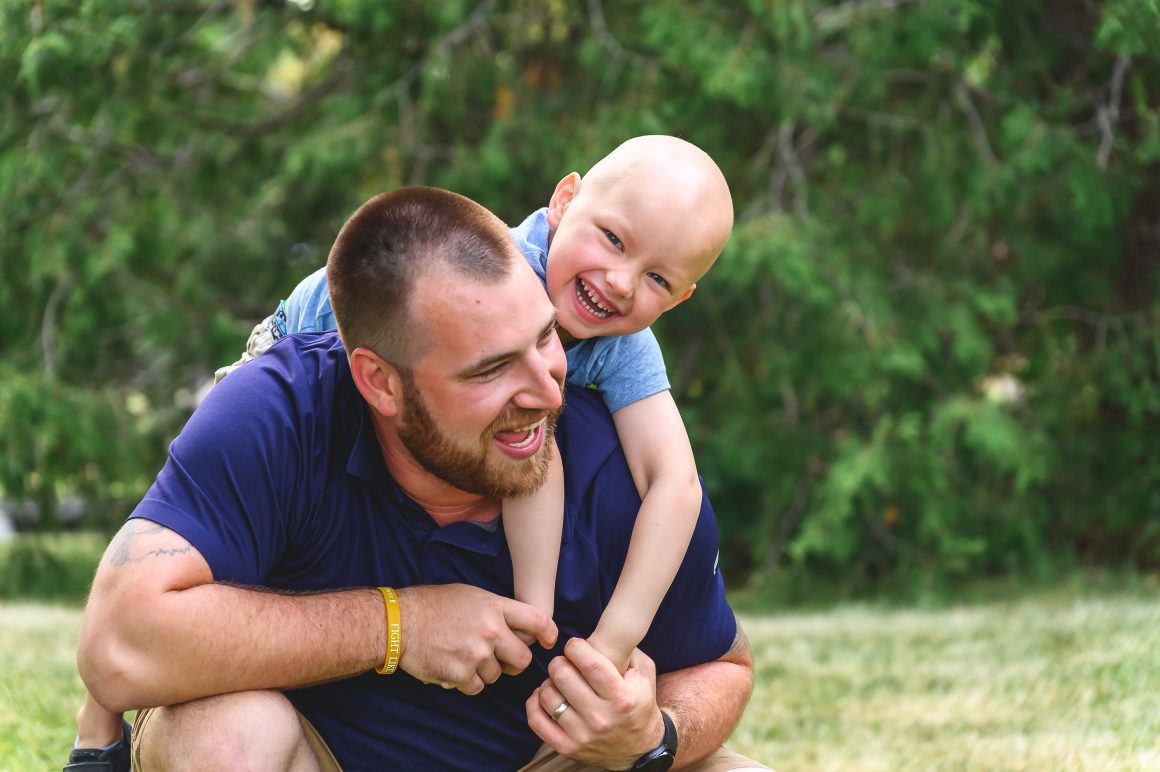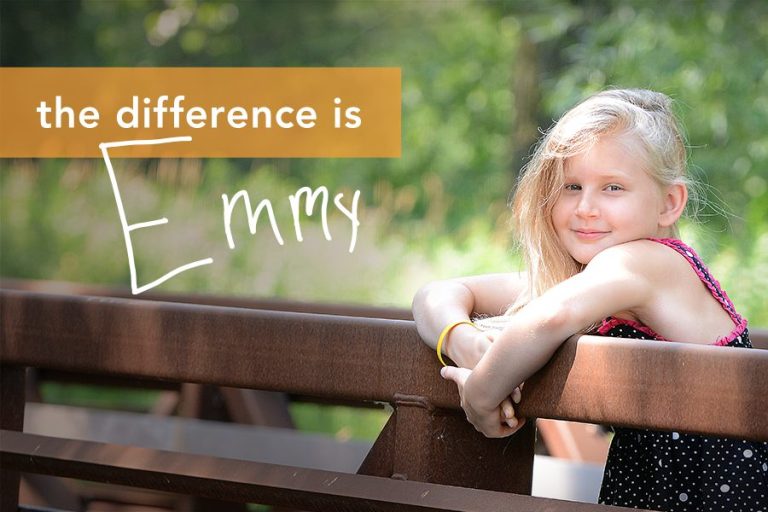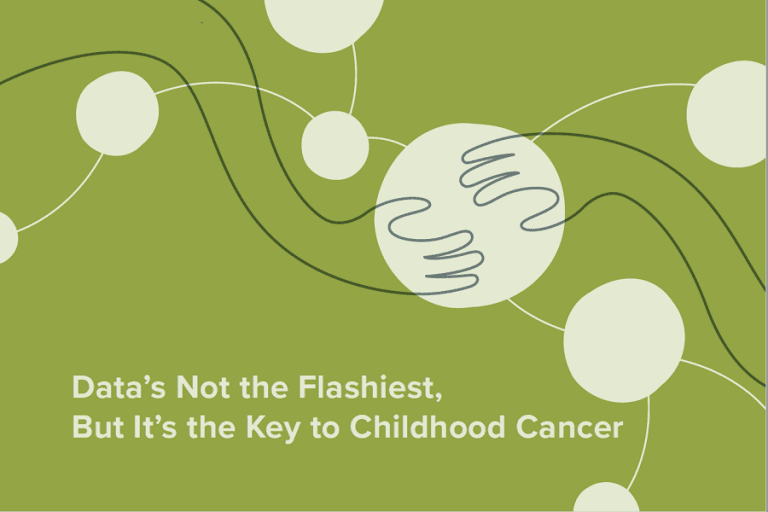Four-year-old Finley isn’t used to silence, even as the introverted twin. At home, he lives with his energetic twin sister named Emerson, his parents, Devan and Becky, three cats and three dogs. “It’s kind of like a mini zoo, but we like it that way,” said Becky. So, when Finley found himself in the hospital Facetiming his sister, whom he’d never been without, it made him really, really sad. “It almost wasn’t even worth it to call and talk to her,” said Becky. “Even if he was in a good mood, it just brought him down.”
Finley’s family had expected him to go back to preschool after winter break in 2022. Instead, he ended up at HSHS St. Vincent’s in Green Bay, WI with an acute lymphoblastic leukemia (ALL) diagnosis.
In the beginning of December, Finley had an ear infection. “We got antibiotics, and the ear infection got better,” said Becky. “But then, a week before Christmas, he would complain whenever he’d put his shoes on. He would still run around with Emerson, still jump on the trampoline. I thought maybe he stepped on it funny or bruised it.” But his foot wasn’t improving. On Christmas Eve, when he usually ran around with his many cousins, he started limping. By the next evening, he was crawling around the floor, begging to be carried.
Becky brought Finley to see the pediatrician the next morning, and the doctor said that the virus from the ear infection must have settled in his foot joints. Over the next few days, his symptoms worsened, and he couldn’t walk at all. After another doctor’s visit, bloodwork and a referral to an orthopedics specialist, Becky got a call from the pediatrician that they wouldn’t be going to orthopedics after all.
Finley was sent to the children’s hospital, where he was diagnosed with ALL and endured a bone marrow biopsy, a lumbar puncture and port placement surgery- all within a couple days. Becky said she has forgotten a lot about the day leading up to his diagnosis, except feeling so grateful that his sister had a new Play-Doh set to distract her from what was going on with Finley.
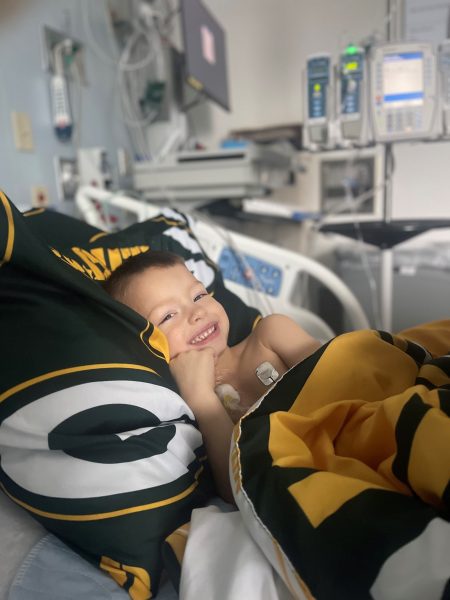
Finley with his Packers gear in the hospital for leukemia treatment
Despite the darkness of a new cancer diagnosis, there was one shining light during Finley’s fourth day of his hospital stay: The fireworks sparkling through his 10th-floor window, coming from the Green Bay Packer’s Lambeau Field.
A Packers superfan, Finley got to watch the Packers beat the Vikings, 10-37, on the floor-to-ceiling TV as celebrating happened right outside. “Sports are such a good outlet,” said Becky. “For those three hours, you can kind of forget…It was a really good night.”
It was also through a hospital window that Finley saw his twin again. Age restrictions prevented Emerson from visiting Finley face-to-face, so she had to stay on the other side of the hematology/oncology floor’s glass doors. “They were touching hands [on each side of] the glass,” Becky said. “That was the point where it was like, this is our life now. He’s saying ‘Hi’ to his sister, who he’s never ever been apart from, through glass. He has to be so careful… For a 4-year-old, or any kid really, it’s so unfair.”
He also had to leave behind one of his main buddies: His 85-pound yellow lab, Bauer. The two are so close, they have matching pajamas. Since he couldn’t bring Bauer to the hospital, Finley toted along a small, stuffed yellow lab and a framed photograph of his beloved dog to place by his bed.
Finley’s treatment plan includes steroids and several phases of chemotherapy. Since his initial diagnosis and first stay at the hospital, he hasn’t had to stay in-patient overnight, something Becky said is rare and feels incredibly fortunate for.
It can be challenging to parent, however, because steroids change Finley’s personality. Normally easy-going, the treatment makes him hungry and crabby. “The week he’s off [of treatment], he’s like a completely different kid,” said Becky.
One of the most difficult procedures for Finley was when nurses placed the needle connected to the chemo bag into his embedded chest port. They explained the procedure to Finley as “the butterfly landing,” because the needle looks like a butterfly with plastic wings. “The day before treatment, he would say, ‘The only part I really don’t like is when the butterfly lands. That hurts so bad.’ But he was so mature about it,” said Becky. “What I love about Finley is his ability to always see greatness in the world. He has an amazing ability to make the best of his situations.”
Finley just finished the round of delayed intensification chemotherapy, which is a demanding phase of treatment. For eight weeks, he packed up with his parents and rode 50 minutes away from home to get hooked up to chemotherapy. While he stayed in the clinic, his sister went to school and danced ballet.
“When Emerson went back to ballet and when we went back to work, it kind of felt like we were almost moving on without him,” said Becky. “It was like we were going back to our normal lives and Finley couldn’t.” She worried he’d feel left behind, but after talking to him about it, he seemed to understand why he couldn’t go back to school. “It’s because I’m sick,” he said.
This September, Finley will undergo the maintenance phase of treatment, which will last two years. To celebrate the end of delayed intensification Finley had a whole weekend devoted to fun and swimming.
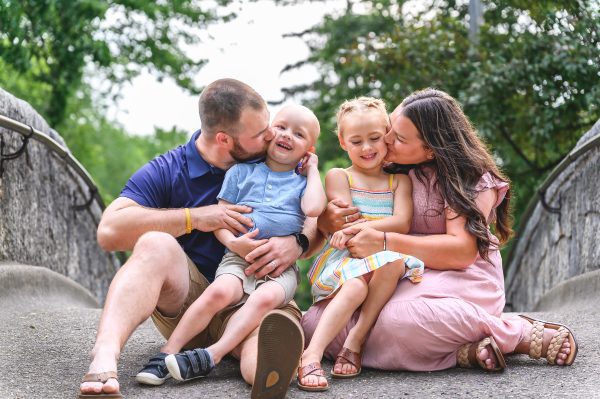
Finley with his parents and twin sister, Emerson.
Aside from doing normal kid activities like swimming, playing with his dog and watching his favorite sports teams play, there’s nothing Finley loves more than monster trucks and construction. This summer, his room got a major remodel complete with a monster truck bed and a pretend garage with tools through a nonprofit called Special Spaces.
While life is completely different for Finley’s family, their strong support system works to make it as normal as possible for them. Even Finley’s hometown tries to make sure Finley doesn’t miss the events that are important to him, like his twin’s dance recitals. Because of his compromised immune system, he can’t be in enclosed, crowded areas. This spring, Emerson’s dance teachers made it possible for Finley to cheer her on at the rehearsal instead, so he wasn’t exposed to too many people.
Despite being unable to go to school due to treatment, his teachers also organized for him to see his friends outside on the last day of school. Becky was nervous about him catching something, but he had missed out on so much, she thought it was worth the risk.
It’s this kind of support that Becky said keeps their family afloat. That’s part of why she shares Finley’s story: to bring awareness to the significant impact it has on kids so other families can get support, too. “Funding and support is so important,” she said. “I feel like that should be available to every single family.”
We can do more for kids like Finley.
Cancer treatments for kids like Finley haven't improved in decades - but we believe we can do better by funding research. Your gift supports researchers searching for better, safer treatments for kids fighting cancer.

